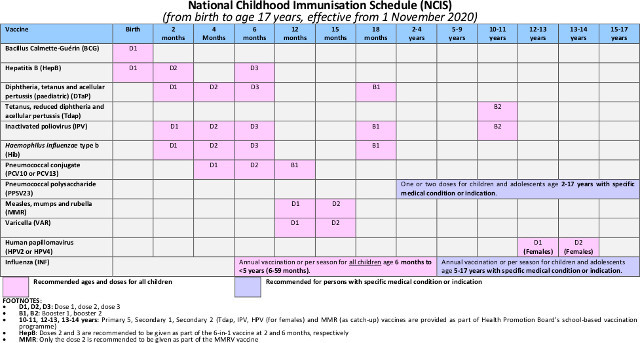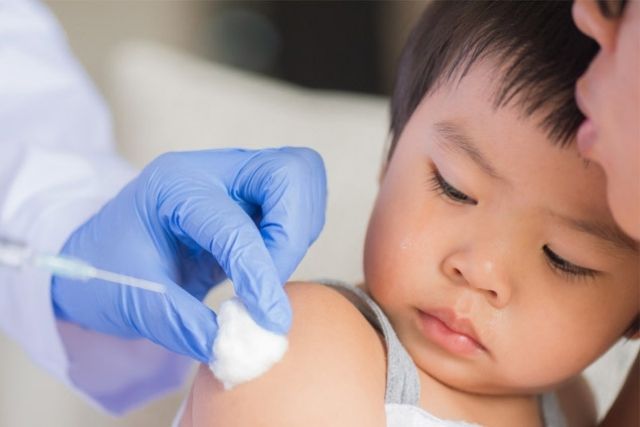As soon as my children were born, the first vaccinations were administered to protect my newborns from various life-threatening diseases such as Hepatitis B. Through their early years, I remember taking them for their scheduled vaccinations, going through the apprehension while waiting to see the doctor, and anticipating the fevers that I might have to nurse them through thereafter.
Nevertheless, I’m glad that Singapore has developed a comprehensive National Childhood Immunisation Programme (NCIP) that protects against more than 10 different types of diseases. (In fact, did you know that BCG immunisation began in mid-1950s as part of the NCIP?)
Vaccinations have given me peace of mind for my children, knowing that they have a better chance at overcoming infections, and staying healthy as much as possible.
Why does my child need to be vaccinated?
According to Dr Petrina Wong, paediatrician at Gleneagles Hospital, “Vaccines help to stimulate your child’s immune system by teaching it to recognise and respond to a disease. Exposure to vaccines will help your child’s body develop antibodies to fight off germs when they are next exposed to them.”
How do vaccines do this? Inside each vaccination, there is a ‘safe’ form of the disease-causing germ, where the germ is weakened or killed. When our body recognizes the antigen in the vaccine, it learns to build the specific antibody, which gives it ‘practice’ on how to defeat the actual germ in the future.
When does my child need to be vaccinated?
There is a National Childhood Immunisation Schedule (NCIS) that details when your child should be vaccinated. Typically, there are quite a few vaccines that newborns have to take until they reach 18 months old, and when they are 10 to 14 years old.
Besides the NCIS, sometimes there are instances we need to add vaccines on a need-to basis. For example, the Covid-19 vaccine has been made available to students aged 12 and above to protect them from the virus. Recently, my son also had to take a tetanus shot after he slipped and was injured by a small cut from a metal sheet.
How can I make vaccinations easier for my child?
It is normal to fear needles, hence understanding how to address common concerns would help make vaccinations easier for your child, and yourself as a parent.
Firstly, being in a safe and trusted environment helps. Do you have a trusted paediatrician who understands your child’s health and knows the family’s or child’s personal history of vaccine reactions? This would enable you to receive personalised advice on how to navigate vaccinations more smoothly. Your child would also feel comfortable seeing the same familiar face each time. Being able to choose a doctor you’re familiar with, and trust, is one of the most compelling reasons why patients opt to see a specialist in private practice at a hospital like Gleneagles.
Secondly, if you are a busy parent, having a trusted paediatrician will also ensure that the vaccination schedule can be planned for you. This would give you the peace of mind in the knowledge that your child will not be missing any crucial appointments as you balance his or her needs with work, and other responsibilities. This saves you the hassle of long waiting times or inconvenient timings.
Thirdly, although the benefits of vaccines far outweigh their risks, be prepared that your child may experience some vaccine-related side effects. Here’s what Dr Petrina Wong, paediatrician at Gleneagles Hospital, advises parents:
“Most (of these side effects) are mild and temporary. They include fever, muscle aches, soreness and redness near the injection site. Rarely, serious adverse effects like allergic reactions may occur.
If your child experiences mild vaccine reactions such as pain at the injection site, a rash, or a fever; here are some steps you can take at home:
- Give your child a cool sponge bath to reduce any fever. Antipyretics like paracetamol can also be given (after approval by your child’s doctor).
- Ensure your child stays hydrated with lots of fluids.
- Use a cool, wet cloth to reduce any redness and swelling at the injection site.
Discuss more with your child’s doctor regarding the specific side effects of each vaccine. Call your doctor if you notice anything unusual with your child.”
Understandably, seeing your child experience a fever can be worrying, even if it’s often expected as a natural immune response.
“Keep your child comfortable and let the body do its part in fighting the fever naturally. However, keep watch to make sure the fever does not escalate,” adds Gleneagles Hospital paediatrician Dr Ratna Sridjaja.
Lastly, if your child is old enough, consider preparing your child to understand what vaccines are and what to expect step by step. I have found visual guides useful in explaining the vaccination journey which reduces anxiety.
Paediatric resources for parents
To understand more about vaccines and how you can find uncompromising care and support for your children, you can check out Gleneagles Hospital’s online resources for family health here.
Catering to a full spectrum of medical needs, Gleneagles Hospital is a multidisciplinary specialist hospital with a diverse team of specialists, paediatricians, and nurses who are able to look after all aspects of your child’s health and development.
In addition, we parents are important too as we are usually the primary caregivers of our children. Being able to take care of our personal health, and that of our children and family, enables us to live our lives to the fullest.
To support parents in living their best lives, Gleneagles Hospital has launched its ‘Live Your Best Life‘ online resource where we can find useful information on topics such as:
- physical wellness for women
- fertility for couples planning for a baby
- family and children health
- unexpected medical emergencies with its 24-hour walk-in clinic
There are so many precious moments we hope to spend with our children. Having vaccines for our safety and peace of mind is just one of many ways we can protect our families. Consider making an appointment here or through WhatsApp at +65 8111 9777.
This post is brought to you by Gleneagles Hospital.
By Julia Chan.
* * * * *
Like what you see here? Get parenting tips and stories straight to your inbox! Join our mailing list here.
Want to be heard 👂 and seen 👀 by over 100,000 parents in Singapore? We can help! Leave your contact here and we’ll be in touch.
















































